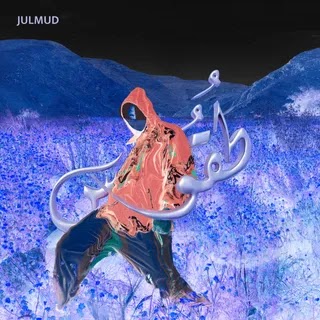The Ramallah producer-rapper’s debut is a border-agnostic collection of beats that participates in a global dialogue while retaining a distinctly Palestinian identity.
In 2018, Boiler Room threw its first-ever party in Ramallah, Palestine. On top of broadcasting the West Bank city’s small but fiercely creative electronic music scene to a worldwide audience, the party gave local DJs an opportunity to play for a local crowd—something Palestinians can’t always take for granted. A lack of venues and a midnight music curfew means the Palestinian scene is largely concentrated on parties at houses or restaurants, and the complex system of permits required by the Israeli occupation to travel in and out of the West Bank makes performing across the wall in Jaffa or Haifa near impossible for many artists. Palestine Underground, a documentary released by Boiler Room in tandem with the event, opens with Ramallah DJ ODDZ climbing over a 26-foot-wall to reach a gig in Jaffa. “I hurt my leg,” he says, limping, “but yeah, worth it.”
Among those booked to play the Ramallah party was Julmud, who—along with his mentor Muqata’a (the “godfather” of Palestinian hip-hop) and the Saleb Wahad crew he rolls with—is making some of the most fascinating and outré instrumental hip-hop since Brainfeeder first blew stoners’ minds in the late ’00s. Tuqoos, his debut for Muqata’a’s Bilna’es label, is a wildly imaginative, border-agnostic collection of beats that carries on a global dialogue while retaining a distinctly Palestinian identity. It is the product of a relentless curiosity, and of musical ideas vaulting easily over the physical and legal barriers separating the people of the West Bank from the rest of the world.
In many ways, Tuqoos evokes Donuts, the early Brainfeeder catalog, and other cornerstones of instrumental hip-hop. The tracks are short, the beats lurch, and sumptuous strings sweep across the stereo field; the overall impression is of a flowing tapestry rather than a sequence of songs. Yet Julmud’s rhythmic sensibility reaches far beyond hip-hop, drawing from jungle (“Juwway”), Afro-Portuguese club music (“Kassara”), juke (“Basmala”), and vaporwave (“Saree’ el thawaban” and “Kalma’”). The album unburdens itself at its very end into “Ur,” a short, finger-picked folk sketch that seems beamed in from the distant past. Listen to “Ur” and start the album over at “Basmala” to get a sense of how far Julmud takes us in just 37 minutes.
Though you could imagine Julmud and crew bobbing their heads to this stuff in the smoke-filled Saleb Wahad studio, Tuqoos does a fine job of balancing its dragging headshop atmosphere with the “aggressive” quality Muqata’a considers inherent to the sound of Palestinian hip-hop. Julmud loves distortion, and “Falnukmel” balances his barbed, hoarse-throated bars (Saleb Wahad makes a point of using Ramallah slang in its verses) with what sounds like scaffolding falling apart in slow motion behind him. “Kassara” is even more abrasive, treating its frantic polyrhythms with a pall of distortion. Yet Tuqoos never slips in balancing its more vibe-friendly stretches with its moments of urgency. They weave in and out of each other inseparably, reminding us how hard-earned this album’s sense of joy, freedom, and discovery really is.



0 comments:
Post a Comment